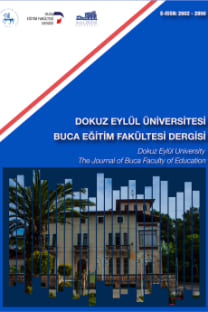İlköğretim Matematik Öğretiminde Oyunla Öğretimin Erişiye Etkisi
Bu araştırmanın amacı, ilköğretim matematik öğretiminde oyunla öğretimin, geleneksel öğretime göre, öğrencilerin erişileri üzerindeki etkisini belirlemektir. Araştırmada "Kontrol Gruplu Öntest—Sontest Model" kullanılmıştır. Araştırma deneysel bir çalışma olduğundan evren ve örneklem belirlememe yoluna gidilmemiştir. Araştırmanın deney evresi 2004— 2005 öğretim yılı bahar döneminde beş hafta boyunca İzmir İli Buca Ilçesi Kaynaklar Beldesi Kaynaklar İlköğretim Okulu 3. sınıflarında "ritmik saymalar, doğal sayılar, toplama, çıkarma, çarpma ve bölme" konularında yapılmıştır. Denencelerin sınanması için gerekli olan veriler araştırmacı tarafından geliştirilen "Erişi Testi" ile elde edilmiştir. Verilerin analizinde aritmetik ortalama, standart sapma ve t-testi kullanılmıştır. Araştırma sonuçları SPSS 10.0 istatistik paket programı kullanılarak elde edilmiştir. Araştırma sonucunda elde edilen bulgulara göre, "Oyunla Öğretim"in uygulandığı deney grubu ile "Geleneksel Öğretim"in uygulandığı kontrol grubunun erişi düzeyleri arasında, deney grubu lehine anlamlı farklar bulunmuştur.
Anahtar Kelimeler:
Matematik, oyun, oyunla öğretim, erişi
The Effects of Using Games on Student Achievement in the Teaching of Mathematics
The purpose of this research was to identify the effects of teaching mathematics in elementary school by games on students' achievements in comparison to the conventional instruction. In this research "Pretest-Posttest Model With a Control Group" was applied. The research was carried out in the 3rd grade of Kaynaklar Primary School in Buca, in İzmir, studying rhythmic counting, natural numbers, addition, subtraction, multiplication and division during five weeks in the second term of 2004-2005 academic year. The data which were necessary for hypothesis' being tested were obtained from "Achievement Tests". The data were analyzed using arithmetic mean, standard deviation and t-test. Research results have been obtained through using SPSS 10.0 statistics package program. According to the research fındings, the achievement level of the experimental group on which "Teaching by Games" was applied was observed to be significantly better than that of the control group who received conventional instruction.
Keywords:
Mathematics, Games, Teaching by Games, Achievement,
- Yayın Aralığı: Yılda 4 Sayı
- Başlangıç: 1992
- Yayıncı: Dokuz Eylül Üniversitesi
Sayıdaki Diğer Makaleler
Yerel Tarih ve Tarih Öğretimindeki Rolü
Fene Yönelik Sorgulayıcı Öğrenme Becerileri Algısı Ölçeği'nin Geliştirilmesi
Ali Günay BALIM, Sabriye Nihan TAŞKOYAN
Türkçe Dil Bilgisi Öğretiminde Yapı Bakımından Cümle Sınıflandırmaları
Türk Öğrencilerinin İngilizce İletişim İsteği
Fen Öğretiminde Çoklu Zeka Kuramı Ve Zihin Haritalarının Kullanımı
Güliz AYDİN, Ali Günay BALİM, Ertuğ EVREKLİ
İlköğretim 5.6.7. Sınıf Öğrencilerinin Müzik Dersine İlişkin Tutumlarının İncelenmesi
Okul Şarkılarının Müzik Öğretmeni Tarafından Piyano İle Eşliklenmesi
